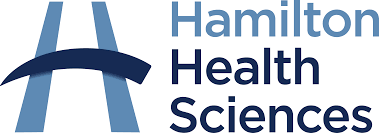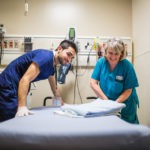Learning at HHS
At Hamilton Health Sciences, we pride ourselves in providing highly collaborative learning environments for patients, families, staff and students.
Why collaborative learning?
Through active participation and contributions of ‘lived experience’, patients and families help us co-design programs, services and solutions that improve the quality of patient and family care.
Collaborative learning provides our staff with professional development opportunities that effectively improve team performance. Our students benefit from experiential learning opportunities that prepare them for the world of health care of today and tomorrow.
We are equally proud of our commitment to leading-edge technologies to support collaborative learning and innovative approaches to measuring value created for patients, families, staff and students.
Taken together, Hamilton Health Sciences understands collaborative learning is a critically important strategy to help us deliver “Best Care for All”.
Simulation, Resuscitation and Outreach Center (SiROC)
The Simulation, Resuscitation and Outreach Center (SiROC) supports excellence in simulation-based education and research at McMaster Children’s Hospital and in the surrounding region. The program offers advanced life support and resuscitation training, simulation and mock exercises for HHS and other healthcare providers, and outreach and support for community partners.
Centre for People Development
The Centre for People Development supports the growth and development of our people, both personally and professionally. The Centre provides learning experiences that will bring global ideas, best practices, and evidence to our world in health care so that we can enhance our skills, expand our perspectives and knowledge, and nurture our spirits and compassion.
ACLS & BLS Courses
Advanced Cardiovascular Life Support (ACLS) Course
This is an advanced, video-based, certified, instructor-led course that builds on the foundation of basic life support (BLS) skills. It emphasizes the importance of continuous, high-quality CPR; high-performing team dynamics and communications; systems of care; recognition and intervention of cardiopulmonary arrest; immediate post-cardiac arrest care; and acute dysrhythmia, stroke, and acute coronary syndromes.
The use of simulation is incorporated to provide real-time feedback on CPR effectiveness. The course uses curriculum and vigorous practice guidelines from the Heart & Stroke Foundation.
Basic Life Support (BLS) Provider Course
A foundational emergency cardiovascular course for all health professionals and first responders intended to help improve patient outcomes. BLS teaches both single-rescuer and team basic life support skills for application in pre-hospital and in-facility settings. Current BLS status is a pre-requisite for advanced and intermediary resuscitation courses. This course uses curriculum from the Heart & Stroke Foundation, and HHS offers BOTH the recertification and full BLS course.
The Canadian Triage & Acuity Scale (CTAS)
The Canadian Triage & Acuity Scale (CTAS) is a tool that enables Emergency Departments (ED) to prioritize patient care and access requirements, examine patient flow and care processes as well as complement other workload, case mix, and resource requirement measures.
For more information, visit: https://www.hamiltonhealthsciences.ca/learning/workshops/
Students & Learners
Hamilton Health Sciences values and supports excellence and innovation in patient care, education and research. The Office of Student Affairs collaborates with our academic and community partners to offer a myriad of both clinical and non-clinical learning opportunities. We endeavor to provide our learners in health professions, research, high school co-op and other programs, with the best possible experience across our multi-site organization.
Student Parking at Hamilton Health Sciences Sites 2024
Learn about our various learning opportunities and how to apply, below. Are you interested in a…
Nipissing University RPN to BScN Blended Learning Program
The Office of Student Affairs has developed a partnership between HHS and Nipissing University to support the RPN to BScN Blended Learning Program. This partnership allows RPNs at HHS the opportunity to study part-time towards a Bachelor of Science in Nursing degree through a 5-year distance education program while continuing to practice as registered staff at HHS.
As a part of the application process, RPNs are required to submit a Letter of Support signed by their unit manager. Please use the copy provided here
If you are looking for information related to the RPN to BScN Blended Learning Program, please visit the website below. Nipissing University has provided an overview of the program and FAQs in this presentation.
 |
Registered Practical Nurse (RPN) to BScN Blended DeliveryThe School of Nursing has formed a number of partnerships with Ontario health care agencies that allow current RPN’s the opportunity to study part-time towards a Bachelor of Science in Nursing degree. |
Job shadow to explore a hospital career
This is an observational experiential education opportunity to assist individuals to make better informed decision about potential career choices. The length of this opportunity can vary between 1-3 days and will be determined by the Office of Student Affairs in collaboration with the hosting unit.
Career Exploration / Job Shadowing is strictly observational with no “hands on” and/or no “direct patient care” activities. As an observer, you must be partnered with a staff member at all times.
Requests to observe or shadow physicians will be evaluated on a case-by-case basis.
Placement or practicum as part of your academic curriculum
An experiential education opportunity is required if it is part of an academic course of study.
If your placement is not related to a school program requirement, please contact studentaffairs@hhsc.ca to further discuss your request.
High School Co-Op Placement
High school students interested in unpaid co-op placements at HHS should contact their school co-op teacher directly. These placements are organized at the school board level in collaboration with HHS.
Volunteer Opportunity
If you are interested in volunteering, please visit the Volunteering page.
Dietetic Practicum
Hamilton Health Sciences Dietetic Practicum
Hamilton Health Sciences is a community of 15,000 staff, physicians, researchers and volunteers that proudly serves southwestern Ontario residents.
In partnership with Brescia University College, Hamilton Health Sciences (HHS) Dietetic Practicum offers opportunities for students in the Diploma in Dietetic Education and Practical Training (DDEPT) and Master of Science in Foods and Nutrition practicum-based (MScFN) programs to develop and apply their food and nutrition expertise in nutrition care, food provision, population health promotion and practice-based project placements as part of their 40-week practicum.
Our program offers many interesting and challenging opportunities for professional and personal growth in a dynamic learning environment. Dietetic practicum students at HHS are active participants in their learning journey and are supported to learn dietetic skills and demonstrate dietetic competencies in a fast-paced, hands-on practical environment.
The HHS dietetic practicum has a strong focus in applying food and nutrition expertise, and is an ideal program for students who are clinically focused and whose career goals consist of working in a hospital-based, acute care setting, providing evidence-informed medical nutrition therapy focused on the management of acute illness and chronic disease in adults or pediatric populations, and performing their role in collaboration with patients and families, and with members of the health care team.
Students in the HHS cohort are supported by the local Brescia-HHS Dietetic Education Coordinator. Placements may take place across any of our multiple sites including: Hamilton General Hospital, Juravinski Hospital, Juravinski Cancer Centre, McMaster Children’s Hospital, St. Peter’s Hospital and West Lincoln Memorial Hospital. Placements may also be completed with our learning partners in the Hamilton/Niagara/Burlington/Brantford region including Family Health Teams, long-term care settings and St. Joseph’s Healthcare Hamilton. Students with the HHS cohort should expect to travel within this region for placement. Placement hours are typically 8 hours per day, Monday thru Fridays with 1 week off in the fall and 2 weeks off over the December holidays. Students in the HHS cohort participate in all Brescia-related education activities.
Nutrition Care Placements
HHS provides specialized, advanced care to people from across the province and is committed to improving the quality of care for our patients through innovation and evidence-informed practices. HHS dietitians are respected members of many health care teams across the organization. They are recognized for their expertise in nutritional assessments and developing individualized nutrition care plans in both inpatient and outpatient settings.
HHS offers excellent adult and pediatric nutrition care learning experiences in our tertiary care facilities. Dietetic students placed with HHS will complete 22 weeks of in-person clinical placements providing them the opportunity to work with diverse populations across the life cycle in a variety of practice settings.
Once students are placed with HHS, those interested in pediatrics will have the opportunity to apply for pediatric focused training. Students with a pediatric focus will have 12 nutrition care weeks dedicated to learning in this population, with the possibility of additional pediatric-related experience in practice-based projects, population health promotion and food provision. There is a separate application process for those students selecting a pediatric focus for their Nutrition Care placements.
Examples of pediatric placement opportunities include:
- Pediatric Surgical Care
- Pediatric Oncology
- Pediatric Intensive Care
- Neonatal Intensive Care
- Eating Disorders
- Children’s Exercise and Nutrition Clinic
- Pediatric Renal Care
- Metabolics
- Pediatric GI clinic
- Ketogenic clinic
Examples of adult nutrition care placements opportunities include:
- Outpatient Cancer Care
- Clinical Neuroscience
- Critical Care
- Medicine
- Stroke
- Rehabilitation
- Oncology
- Hematology
- Cardiac Surgery
- Cardiac Critical Care
- Cardiac Health and Rehabilitation
- Burn and Trauma Unit
- Surgical Care
- Palliative Care
Practice-based Project
Hamilton Health Sciences is a teaching hospital with significant medical research activities. DDEPT students may complete a 6-week research or practice-based project supported by dietitians at HHS, or may complete these weeks at an organization outside of HHS. This placement may be individual or in student pairs. Activities are project-based and may be in-person, virtual or both.
Food Provision Placement
Students will complete their 6-week food service management placement in student pairs in-person at HHS. This placement provides opportunities for students to engage in departmental project work requiring critical thinking and analysis to address current issues. Food Services at HHS is managed by Compass One Health care.
The Food Services leadership team oversee Patient Food Services placements, which offer experiences in:
- Food procurement, food handling and related audits
- Personnel management and scheduling
- Budget planning, project management
- CBORD systems to manage food service operations (i.e., purchasing/inventory, costing)
- CBORD systems diet office automation (i.e., diet/food compliance, menus, tray tickets)
- Legislated and mandatory staff training and practices
Population Health Promotion Placement
Students may complete a 6-week population health placement with the HHS SHINE Wellness team or at an organization outside of HHS. This placement may be individual or student pairs. Activities are project-based and may be in-person, virtual or both.
Applications for practical training at HHS are coordinated through Brescia University College.
Please see the following websites for application details.
Diploma in Dietetic Education and Practical Training (DDEPT)
https://brescia.uwo.ca/diploma_certificate/ddept/future_students/apply_now.php
Masters of Science in Foods and Nutrition with practical training (MScFN)
https://brescia.uwo.ca/graduate/mscfn_practicum-based/future_students/admissions.php
Medical Learner Placement
Electives for undergraduate medical students and residents are coordinated by McMaster University.
For more information about undergraduate medical electives, please view the website for the Undergrad MD Electives Office at McMaster University.
For more information for resident electives, please view the website for the Postgraduate Medical Education Office at McMaster University.
For information about credentialing, contact Medical Affairs.
Note: Hamilton Health Sciences does not accommodate observerships for undergraduate medical students.
Psychology Predoctoral Residency Program
HHS offers two Predoctoral Psychology Residency Programs accredited by the Canadian Psychological Association (CPA). In these programs, residents are exposed to a range of patient populations and intervention approaches through their participation on interdisciplinary teams. This breadth and depth is an attractive attribute of the Predoctoral Residency Programs at Hamilton Health Sciences.
There are two Predoctoral Psychology Residency Programs at Hamilton Health Sciences, each with separate brochures
Pre-doctoral residency in clinical child psychology brochure
Pre-doctoral residency program in clinical neuropsychology brochure
The Residency Programs at HHS are both accredited by the Canadian Psychological Association (CPA; until 2028 and 2029). Further information on accreditation can be obtained from the CPA Accreditation Office – 141 Laurier Avenue West, Suite 702, Ottawa, Ontario K1P 5J3, 1-888-472-0657, or online at: http://www.cpa.ca/accreditation/whatis/. Please see the brochure for more information.
Contacts:
GTA Psychology Practicum
Awards, Applause, and Accolades
Regional Rehabilitation Centre (RRC) Physiotherapy Team selected to receive the “Contributions to the School” award from McMaster School of Rehabilitation Science.
The team at RRC have been dedicated to excellence in clinical supervision and have been a reliable source of providing placement opportunities for our students in every placement period, across all cohorts. In consideration of the global pandemic, a time of increased pressure and stress, this team has continued to demonstrate unwavering support of McMaster PT learners. They have demonstrated creativity and initiative in encouraging and working with team members to take on the role of clinical instructor in order to continue providing excellent and ample opportunities.
HHS Staff
Hamilton Health Sciences offers a number of resources for staff, including orientations, workshops, and staff libraries.
Learn more about these resources below.
Orientations
Hamilton Health Sciences is committed to engage, empower and enable our people to deliver on our mission. Orientation welcomes all new staff and introduces the values and culture of the organization, who we are and where we are going. This is coordinated through an orientation pathway, complemented with program, service and area specific orientation. Role specific along with interprofessional orientation experiences, strengthen contributions to the broader teamwork and interprofessional practice that is required to deliver on our mission.
Workshops
Hamilton Health Sciences supports our care teams with the following workshop opportunities. Health professional colleagues with other organizations are welcome to contact us to learn more about attending our workshops.
Staff Library
The staff libraries at Hamilton Health Sciences (HHS) provide access to quality health information for hospital staff, associated physicians and residents, and learners.
Library staff are available to assist users in finding evidence based information to support patient care by:
- Conducting literature searches
- Retrieving books and research articles
- Providing individual or group teaching sessions on effective searching
All electronic resources, including books, journals and databases, can be found on the HHS Intranet through the library portal called the Clinical Reference Library. Print collections and study space can also be found at the Hamilton General Hospital, Juravinski Hospital, McMaster University Medical Centre (MUMC), and St. Peter’s Hospital sites.
Contact Information
- Hamilton General Hospital library: libraryg@hhsc.ca
- Juravinski Hospital library: libraryjh@hhsc.ca
- MUMC library: librarymumc@hhsc.ca
- St. Peter’s Hospital library: librarySPH@hhsc.ca

